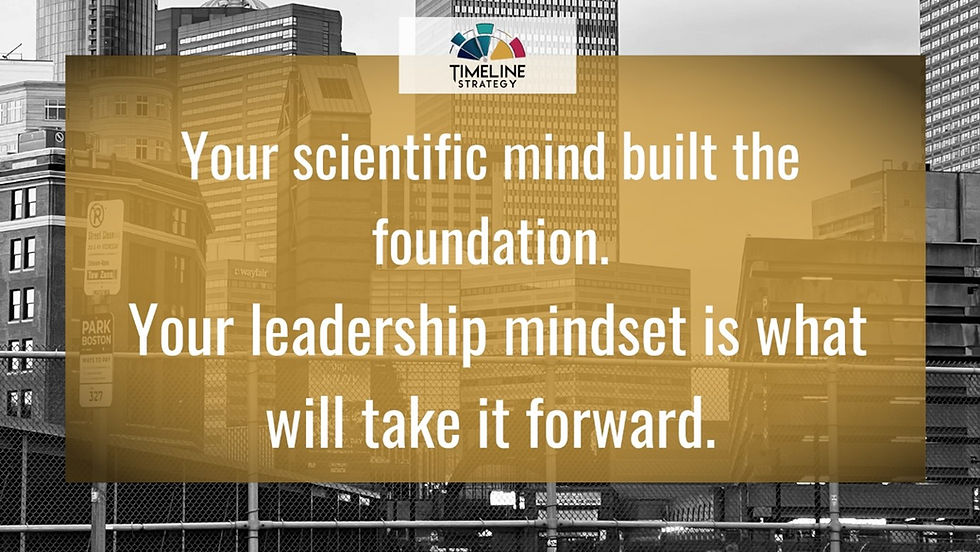From Lab Logic to Leadership: How Scientific Thinking Holds Back Biotech Operations
- Attila Foris

- Nov 19, 2025
- 4 min read

The Invisible Obstacle
👉 Brilliant science. Stalled progress.
It’s a pattern we see far too often in early-stage biotech operations and startups. The experiments work. The data looks promising. But decisions lag, the team spins, and investors get nervous.
Science isn’t the problem; scientific thinking is.
What makes you excel in the lab can quietly sabotage your leadership in the boardroom.
👉 Scientific thinking rewards depth, rigor, and precision. But in a startup, those same instincts to analyze deeply, minimize error, and delay action until “enough” data is in can kill momentum.
👉 Most founders don’t even realize they’re still running their company like an academic research group. They explain instead of deciding. They analyze instead of acting.
✅ This post explores how scientific thinking can become a leadership liability and what mindset shifts are needed to evolve from research reflexes to CEO decisions.
✅ You don’t need to abandon your scientific instincts. But you do need to adapt them if you want your startup to scale.
The 3 Golden Rules of Scientific Thinking — and Why They Break Down in Biotech Operations Leadership
👉 Scientific thinking trains you to be precise, methodical, and skeptical. These instincts are critical in the lab, but they often undermine leadership when blindly applied in a startup.
Let’s unpack the three core “rules” most scientific founders unconsciously carry into their companies:
1️⃣ “Only act when the data is solid.”
In research, acting on incomplete or shaky data can destroy your credibility. In startups, waiting too long for certainty can destroy your momentum.
👉 Biotech founders often delay critical business moves, hiring, BD outreach, or funding decisions, because the data isn't “mature enough.” But in business, decisions must be made under uncertainty. Clarity doesn’t precede action; it follows it.
2️⃣ “Eliminate error at all costs”
Labs are built around error reduction. You control variables. You minimize noise. But startups are inherently noisy. Trying to eliminate all risk leads to overengineering and stagnation.
👉 Instead of shipping early and iterating, many scientific founders keep refining decks, processes, and team structures until they feel bulletproof. But by then, the window of opportunity has often closed.
3️⃣ “Deep analysis leads to better answers”
Scientific training favors deep thinking. More analysis = better outcomes. But in leadership, depth without speed equals paralysis.
👉 Startups don’t reward depth alone; they reward direction and decisiveness. Over-analysis becomes a form of avoidance. And while you're analyzing, someone else is executing.
👉 Bottom line: Scientific thinking is invaluable, but only when it’s reframed for the role you’re actually in.
✅ You’re not optimizing experiments anymore. You’re steering a company.
Startups Play by Different Rules — and Most Scientific Founders Miss That
A research lab is designed for precision. A startup is designed for progress.
And that difference changes everything.
👉 Scientific thinking values thoroughness, error reduction, and complete data before action. But in the startup environment, these instincts can quickly become liabilities. You rarely have perfect data.
👉 You can’t eliminate every variable. And waiting too long often means missing the moment.
Startups demand something different:
✅ Clarity of direction even when the picture is incomplete. The ability to decide when no option is risk-free. The discipline to align a team without all the answers.
Founders who keep operating like researchers often create internal confusion. They revise instead of committing. They analyze instead of align. They aim for perfect clarity, and in doing so, they delay momentum, erode trust, and weaken execution.
✅ Scientific thinking can make you cautious when your company needs decisiveness.
Unless you update the way you lead, your startup will struggle to translate insight into impact.

How to Know If You're Still Leading Like a Scientist
👉 Leadership isn’t a title. It’s a way of thinking.
And if your thinking is still shaped by academic norms, your startup will keep running like a lab, not a company.
👉Scientific thinking is precise. Leadership thinking is directional.
The transition between the two isn’t automatic, even for the most capable founders. It requires conscious shifts in how you process uncertainty, how you frame decisions, and how you lead people through ambiguity.
Here are three questions to help you check in with yourself:
1️⃣ Do you delay or dilute decisions while waiting for more clarity?
Real leadership often means choosing without all the answers. If you find yourself looping decisions or delegating them upward, you might be leaning on scientific habits to avoid risk.
2️⃣ Do you overvalue internal logic over external action?
It’s tempting to refine the deck, rework the roadmap, or re-analyze the market. But leadership is outward-facing. It’s about choosing direction, enabling others to move, and owning tradeoffs with imperfect inputs.
3️⃣ Do you explain more than you align?
Explaining a model is not the same as rallying a team. When your communication centers on logic and detail instead of clarity and momentum, your team stays in wait mode, and execution stalls.
✅ The shift from scientist to CEO is not about abandoning your expertise. It’s about realizing that your value now lies in decisions, not just in depth.
Strategic Takeaway
👉 Scientific thinking will always be your strength, but it must be reshaped to serve your new role.
👉 As a biotech founder, your impact no longer comes from precision alone, but from your ability to lead through uncertainty, prioritize progress over perfection, and turn insight into execution.
✅ Leadership is not the opposite of science. It’s what gives it direction.
Ready to Break Your Bottlenecks?
If you're feeling the friction — indecision, misalignment, slow momentum — it's not just operational. It's strategic.
Attila runs focused strategy consultations for biotech founders who are ready to lead with clarity, not just react to pressure. Whether you're refining your narrative, making tough tradeoffs, or simply feeling stuck, this session will get you unstuck — fast.






Comments